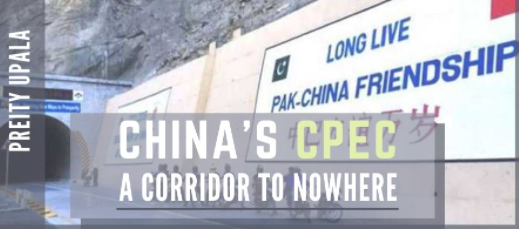Virendra Pandit
New Delhi: With the ultra-ambitious, USD 60 billion China-Pakistan Economic Corridor (CPEC) turning into a white elephant, and Beijing tightening screws on Islamabad to speed up both security of its staff and de-bottlenecking the processes, Pakistan has found not one but two convenient scapegoats to shift the blame: the US and India.
The US, because it’s President Joe Biden, since his Inauguration in January 2021, has completely ignored, not even called once, Pakistan Prime Minister Imran Ahmed Khan Niazi. In fact, Imran has been obliquely blaming Washington for all the ills Islamabad is facing, including a plummeting economy and terror.
And India, because its next-door neighbor can be used as a punching bag anytime.
So, Khalid Mansoor, chairperson of the CPEC Authority, has accused the US and India of sabotaging the mammoth project, launched in 2015 as the economic lifeline of Pakistan, which, however, is going nowhere.
Because of multiple failures in its implementation, on August 4, 2021, he replaced Lt. Gen. (Retd) Asim Saleem Bajwa as the new CPEC chief. Just 11 days later, the Taliban returned to power in Afghanistan, potentially jeopardizing the CPEC amid increased terror attacks in neighboring Baluchistan as well.
“From the point of view of the emerging geostrategic situation, one thing is clear: the United States, supported by India, is inimical to CPEC. It will not let it succeed. That’s where we have to take a position,” the media quoted him as saying while addressing the CPEC Summit at the Institute of Business Administration in Karachi on Saturday.
For the record, Mansoor is also the Special Assistant to the Pakistan PM on CPEC affairs.
He claimed that the US and India continue to make efforts to wean Pakistan away from China’s Belt and Road Initiative (BRI) — a USD 200 billion global infrastructure development plan, including the CPEC as flagship project — under which Beijing has been investing heavily in about 70 countries across Asia, Africa, and Europe.
“There’s no way Pakistan will forgo any of its benefits. It has more than once burnt its fingers in (the western) alliance in the past,” he said, adding that their attempts to dilute China’s strategic influence in the region will fail.
Mansoor said the western powers view the CPEC as a symbol of China’s political ambition, media reports said.
“That’s the reason CPEC is seen suspiciously by both the United States and Europe… they view it more than a move by China to expand its political, strategic, and business influence,” he said, claiming that Beijing has allayed that apprehension “to a great extent.”
The US is now “taking stock of the economic and political consequences” of withdrawing from the region, Mansoor said.
Ironically, while claiming that US and India were ‘sabotaging’ the CPEC, he said:
“I had a detailed discussion with the people in the American embassy. I told them CPEC is available for them as well. They have also expressed their wish that they would like to develop some kind of involvement and see how it can be beneficial for both countries.”
Islamabad is seeking the expansion of the CPEC to Afghanistan, he said, adding there has been a “deep interest” in developing economic connectivity between Afghanistan and Pakistan.
Pakistan’s influential English daily Dawn said, quoting western think tanks, that the CPEC is an economic trap that has already resulted in bloated public debt levels alongside disproportionately high Chinese influence in Pakistan’s economy.
The CPEC aims to connect western China with the Gwadar seaport in southwestern Pakistan through a network of roads, railways, and other projects of infrastructure and development. Islamabad is the seventh-largest recipient of Chinese overseas development financing, with 71 projects worth USD 27.3 billion currently underway as part of the CPEC.

